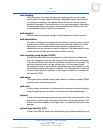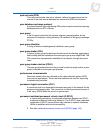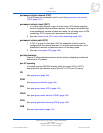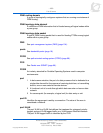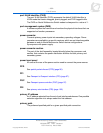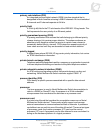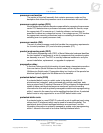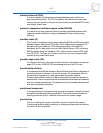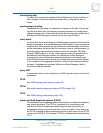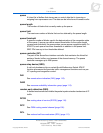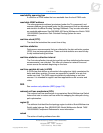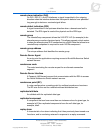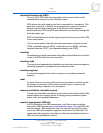
- 106 -
List of terms
Nortel Multiservice Switch 7400/15000/20000
Terminology
NN10600-005 7.2S1 Standard
PCR7.2 and up March 2006
Copyright © 2006, Nortel Nortel Confidential
processor card section
The section of the shelf assembly that contains processor cards and the
backplane that allows the processor cards to communicate with each other.
processor control system (PCS)
Nortel Multiservice Switch subsystem responsible for managing the processor
cards. PCS detects when a processor becomes available for service, maps
the appropriate LP to execute on it, loads its software, and monitors its
execution to detect any outage that occurs. If an outage occurs, PCS invokes
the appropriate recovery procedures (such as restarting the software or
switching over to a spare processor card).
processor module (PM)
The part of some processor cards that handles the processing requirements
for a control processor (CP) and a function processor (FP).
product engineering code (PEC)
The product engineering code (PEC) of Nortel Networks hardware identifies
the part number of equipment or a set of components that combine to make
an assembly or a unit. The PEC is used by hardware installers to verify the
correct installation, replacement, or upgrade of equipment.
propagation delay
Is the time it takes one bit of information to travel along a transmission medium
from one device (Nortel Multiservice Switch node) to its neighbor device
(Multiservice Switch node). Propagation delay is a function of the speed of an
electrical (optical) signal and the distance to be travelled.
protected default route (PDR)
A protected default route is a static route to the default route 0.0.0.0,
provisioned as ‘protected’, and provisioned with multiple nextHops, each
using a unique local IP interface. Because a PDR is protected, the operational
states of these nextHops/interfaces are monitored, and the forwarding
information for this route is optimally managed to enable route reprogramming
within 1 second in the case of an active nextHop/interface failure. A protected
default route is only supported for a non-ECMP default static route.
protected static route
A protected route is a non-ECMP IP route with a set of nextHops (each using
unique local IP interfaces) which can be used to forward the packet. The
operational state of these nextHops/interfaces are monitored, and the
forwarding information is optimally managed to enable route reprogramming
within 1 second in the case of an active nextHop/interface failure.



